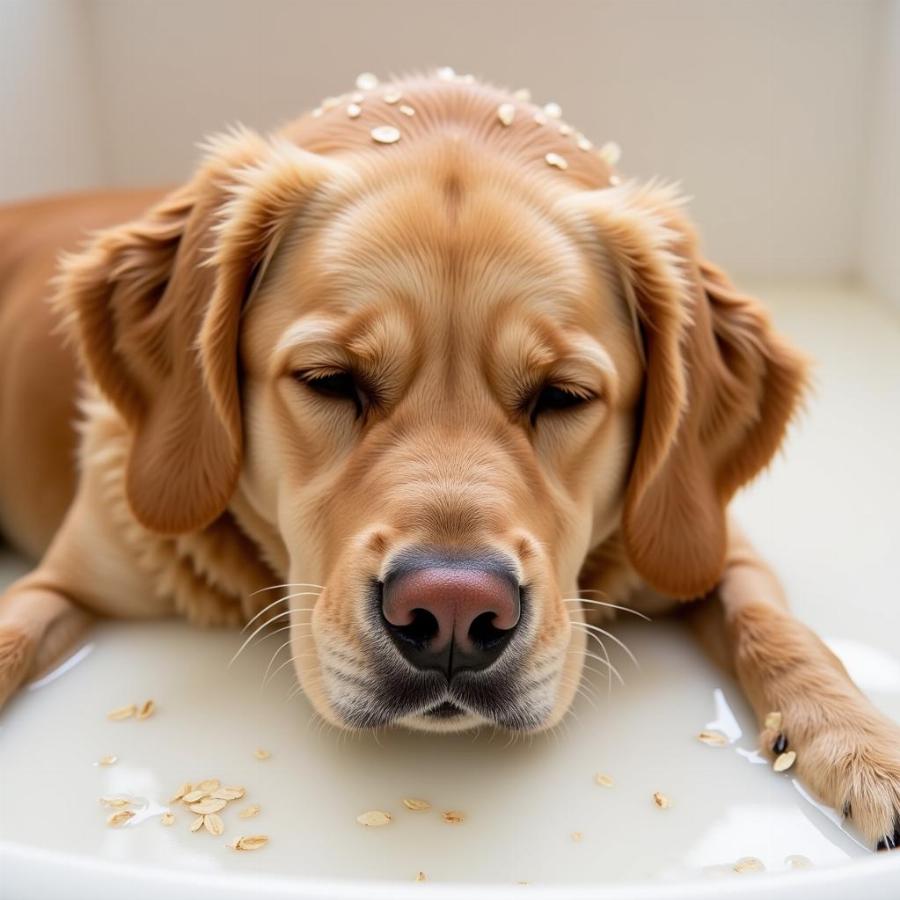Dealing with a dog experiencing a yeast infection can be frustrating for both you and your furry friend. These infections, often caused by an overgrowth of yeast (a type of fungus) on their skin, can lead to discomfort and incessant itching. While it’s crucial to consult a veterinarian for diagnosis and treatment, there are some home remedies that can provide relief and support your dog’s recovery process.
Understanding Yeast Infections in Dogs
Before delving into home remedies, it’s essential to understand what causes yeast infections in dogs. Yeast thrives in warm, moist environments, making areas like the paws, ears, and skin folds particularly susceptible. Several factors can contribute to yeast overgrowth, including:
- Allergies: Dogs with allergies, whether environmental or food-related, are more prone to yeast infections.
- Moisture: Dampness trapped in skin folds or ears creates an ideal breeding ground for yeast.
- Compromised Immune System: Dogs with weakened immune systems may be more susceptible to yeast infections.
- Antibiotics: While sometimes necessary, antibiotics can disrupt the balance of bacteria and fungi on the skin, potentially leading to yeast overgrowth.
Effective Home Remedies for Dog Yeast Infections
Remember to always consult your veterinarian before trying any home remedies. They can help determine the underlying cause of the infection and ensure the chosen remedy is safe for your dog.
1. Apple Cider Vinegar Rinse
Apple cider vinegar possesses antifungal properties that can help combat yeast overgrowth.
How to use:
- Dilute apple cider vinegar with water (1:1 ratio).
- Apply the solution to affected areas using a cotton ball or spray bottle.
- Allow it to air dry.
- Repeat 2-3 times daily.
Caution: Avoid using apple cider vinegar on open sores or irritated skin, as it can cause stinging.
2. Coconut Oil Treatment
Coconut oil contains lauric acid, known for its antifungal and antibacterial properties.
How to use:
- Apply a small amount of organic, virgin coconut oil to affected areas.
- Gently massage it into the skin.
- Repeat 2-3 times daily.
Benefits: Besides its antifungal properties, coconut oil can help soothe itchy skin and promote healing.
3. Soothing Oatmeal Baths
Oatmeal baths are known for their soothing properties, which can provide relief from itching and inflammation associated with yeast infections.
How to:
- Grind plain, unflavored oatmeal into a fine powder.
- Add the powder to lukewarm water in your dog’s bath.
- Let your dog soak for 5-10 minutes.
- Rinse thoroughly and pat dry.
Frequency: Give oatmeal baths 2-3 times per week.
 Golden Retriever Relaxing in Oatmeal Bath
Golden Retriever Relaxing in Oatmeal Bath
4. Probiotic Supplements
Probiotics can help restore the balance of good bacteria in your dog’s gut, indirectly aiding in yeast control.
Choosing a Probiotic: Consult your vet for recommendations on probiotic brands and dosages suitable for your dog.
Benefits: In addition to supporting gut health, probiotics can boost the immune system and potentially reduce the recurrence of yeast infections.
5. Dietary Changes
Feeding your dog a balanced diet rich in high-quality protein, healthy fats, and limited carbohydrates can support their overall health and immune system, making them less susceptible to yeast infections.
Foods to Avoid: Sugary treats, processed foods, and foods high in carbohydrates can exacerbate yeast overgrowth.
When to See Your Vet
While home remedies can offer relief, it’s crucial to remember that they are not a substitute for veterinary care. If your dog’s symptoms persist or worsen, consult your veterinarian immediately.
Here are some signs that warrant a vet visit:
- Intense itching, redness, or swelling
- Foul odor emanating from the affected area
- Hair loss
- Discharge from ears or skin
- Lethargy or loss of appetite
Beaut Dogs: Your Partner in Dog Care
At Beaut Dogs, we are committed to providing dog owners with trustworthy information and resources to help them care for their furry companions. We understand that dealing with yeast infections can be challenging, and we aim to empower you with the knowledge to provide your dog with the best possible care. For further assistance and personalized advice on managing yeast infections in dogs, please don’t hesitate to contact us at [email protected]. We are here to help!